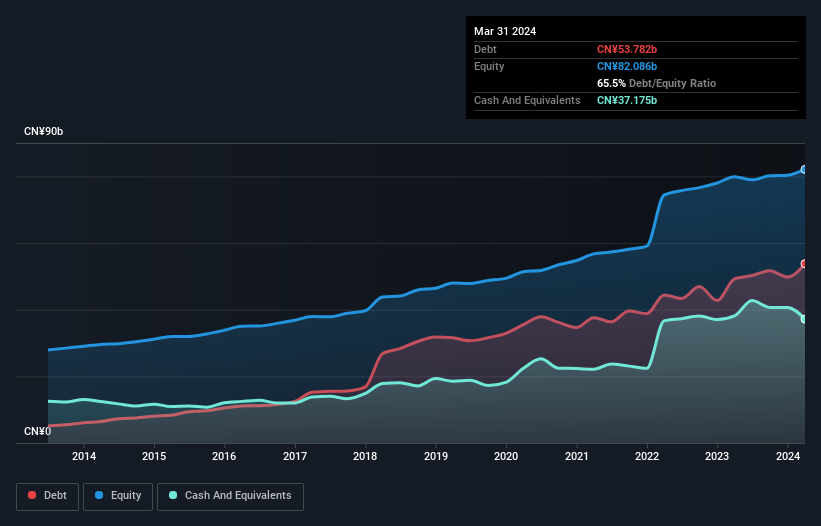- China
- /
- Healthcare Services
- /
- SHSE:601607
Shanghai Pharmaceuticals Holding (SHSE:601607) Has A Somewhat Strained Balance Sheet

The external fund manager backed by Berkshire Hathaway's Charlie Munger, Li Lu, makes no bones about it when he says 'The biggest investment risk is not the volatility of prices, but whether you will suffer a permanent loss of capital.' It's only natural to consider a company's balance sheet when you examine how risky it is, since debt is often involved when a business collapses. We note that Shanghai Pharmaceuticals Holding Co., Ltd (SHSE:601607) does have debt on its balance sheet. But the real question is whether this debt is making the company risky.
Why Does Debt Bring Risk?
Debt and other liabilities become risky for a business when it cannot easily fulfill those obligations, either with free cash flow or by raising capital at an attractive price. Part and parcel of capitalism is the process of 'creative destruction' where failed businesses are mercilessly liquidated by their bankers. However, a more common (but still painful) scenario is that it has to raise new equity capital at a low price, thus permanently diluting shareholders. By replacing dilution, though, debt can be an extremely good tool for businesses that need capital to invest in growth at high rates of return. When we examine debt levels, we first consider both cash and debt levels, together.
View our latest analysis for Shanghai Pharmaceuticals Holding
How Much Debt Does Shanghai Pharmaceuticals Holding Carry?
You can click the graphic below for the historical numbers, but it shows that as of March 2024 Shanghai Pharmaceuticals Holding had CN¥53.8b of debt, an increase on CN¥49.3b, over one year. On the flip side, it has CN¥37.2b in cash leading to net debt of about CN¥16.6b.

How Healthy Is Shanghai Pharmaceuticals Holding's Balance Sheet?
Zooming in on the latest balance sheet data, we can see that Shanghai Pharmaceuticals Holding had liabilities of CN¥125.3b due within 12 months and liabilities of CN¥10.1b due beyond that. Offsetting this, it had CN¥37.2b in cash and CN¥88.3b in receivables that were due within 12 months. So it has liabilities totalling CN¥9.89b more than its cash and near-term receivables, combined.
Of course, Shanghai Pharmaceuticals Holding has a market capitalization of CN¥62.6b, so these liabilities are probably manageable. Having said that, it's clear that we should continue to monitor its balance sheet, lest it change for the worse.
We measure a company's debt load relative to its earnings power by looking at its net debt divided by its earnings before interest, tax, depreciation, and amortization (EBITDA) and by calculating how easily its earnings before interest and tax (EBIT) cover its interest expense (interest cover). This way, we consider both the absolute quantum of the debt, as well as the interest rates paid on it.
Shanghai Pharmaceuticals Holding has net debt worth 1.7 times EBITDA, which isn't too much, but its interest cover looks a bit on the low side, with EBIT at only 6.0 times the interest expense. While these numbers do not alarm us, it's worth noting that the cost of the company's debt is having a real impact. Unfortunately, Shanghai Pharmaceuticals Holding saw its EBIT slide 5.7% in the last twelve months. If that earnings trend continues then its debt load will grow heavy like the heart of a polar bear watching its sole cub. The balance sheet is clearly the area to focus on when you are analysing debt. But ultimately the future profitability of the business will decide if Shanghai Pharmaceuticals Holding can strengthen its balance sheet over time. So if you're focused on the future you can check out this free report showing analyst profit forecasts.
Finally, a company can only pay off debt with cold hard cash, not accounting profits. So we always check how much of that EBIT is translated into free cash flow. In the last three years, Shanghai Pharmaceuticals Holding created free cash flow amounting to 2.4% of its EBIT, an uninspiring performance. For us, cash conversion that low sparks a little paranoia about is ability to extinguish debt.
Our View
Shanghai Pharmaceuticals Holding's conversion of EBIT to free cash flow was a real negative on this analysis, although the other factors we considered cast it in a significantly better light. For example, its level of total liabilities is relatively strong. We should also note that Healthcare industry companies like Shanghai Pharmaceuticals Holding commonly do use debt without problems. Looking at all the angles mentioned above, it does seem to us that Shanghai Pharmaceuticals Holding is a somewhat risky investment as a result of its debt. That's not necessarily a bad thing, since leverage can boost returns on equity, but it is something to be aware of. When analysing debt levels, the balance sheet is the obvious place to start. But ultimately, every company can contain risks that exist outside of the balance sheet. To that end, you should be aware of the 2 warning signs we've spotted with Shanghai Pharmaceuticals Holding .
When all is said and done, sometimes its easier to focus on companies that don't even need debt. Readers can access a list of growth stocks with zero net debt 100% free, right now.
New: Manage All Your Stock Portfolios in One Place
We've created the ultimate portfolio companion for stock investors, and it's free.
• Connect an unlimited number of Portfolios and see your total in one currency
• Be alerted to new Warning Signs or Risks via email or mobile
• Track the Fair Value of your stocks
Have feedback on this article? Concerned about the content? Get in touch with us directly. Alternatively, email editorial-team (at) simplywallst.com.
This article by Simply Wall St is general in nature. We provide commentary based on historical data and analyst forecasts only using an unbiased methodology and our articles are not intended to be financial advice. It does not constitute a recommendation to buy or sell any stock, and does not take account of your objectives, or your financial situation. We aim to bring you long-term focused analysis driven by fundamental data. Note that our analysis may not factor in the latest price-sensitive company announcements or qualitative material. Simply Wall St has no position in any stocks mentioned.
Have feedback on this article? Concerned about the content? Get in touch with us directly. Alternatively, email editorial-team@simplywallst.com
About SHSE:601607
Shanghai Pharmaceuticals Holding
Shanghai Pharmaceuticals Holding Co., Ltd.
Undervalued with excellent balance sheet and pays a dividend.
Similar Companies
Market Insights
Community Narratives



